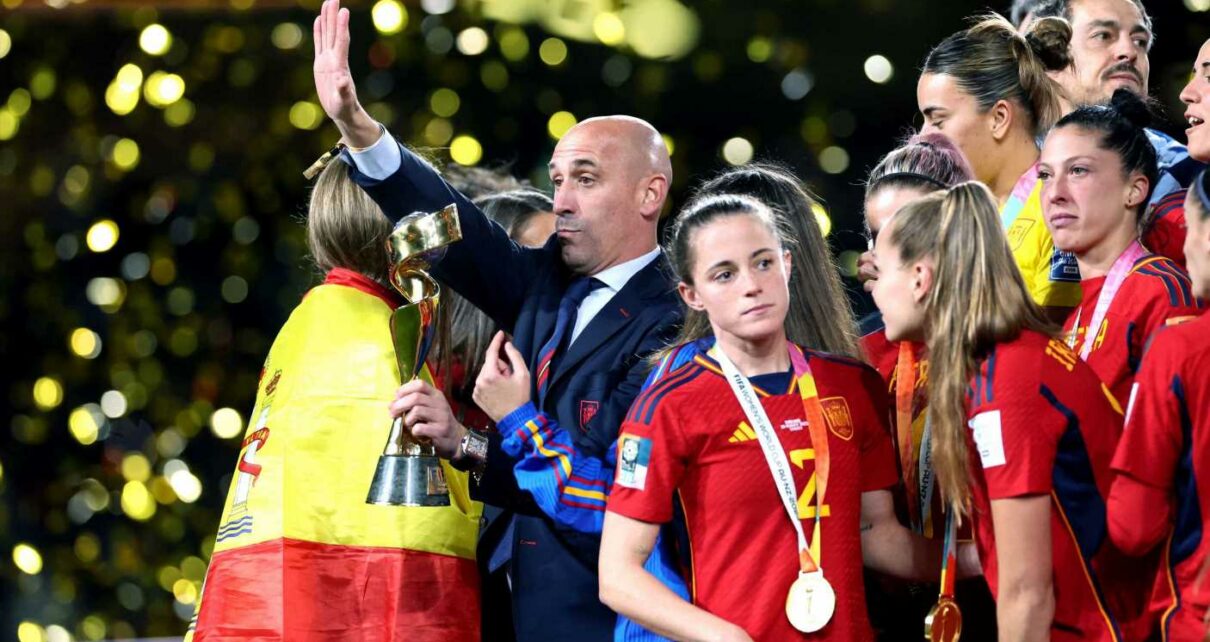Sign up to Miguel Delaney’s Reading the Game newsletter sent straight to your inbox for free
Sign up to Miguel’s Delaney’s free weekly newsletter
Thanks for signing up to the
Football email
The committee which imposed a three-year ban on former Spanish Football Federation president Luis Rubiales for his conduct at the Women’s World Cup final said it had been tempted to impose a more severe sanction.
A FIFA disciplinary committee said Rubiales had acted with “a sense of complete impunity” at the Spain v England match on August 20 in Sydney.
He grabbed his genitals in celebration of Spain’s victory while stood in the VIP area and kissed midfielder Jennifer Hermoso on the lips during the medal presentation. Hermoso has said she did not consent to the kiss.
The committee, which imposed a ban on Rubiales on October 30, said in the written grounds of its decision: “All incidents assessed collectively, (together with Rubiales’ position in relation to them) appear to reveal a sense of complete impunity on the part of the respondent within the football environment.
“It was absolutely and categorically expected of him to maintain and embody the highest levels of professionalism, beyond the usual standards, especially at a moment where his country was at the apex level of women’s football.
“In this regard, the committee could not stress enough that – regardless of the emotional state he was in during and after the match – (Rubiales’) behaviour was inexcusable and unacceptable, especially considering his high rank within the football ecosystem at the time.
“While taking into account the undeniable media impact of (Rubiales’) behaviour and its repercussions on the reputation of football as well as of FIFA, but also and more importantly, on (Hermoso’s) mental state, the committee considered that a ban for a duration of three years was justified.
“The committee wished to stress that it was tempted to impose more severe sanctions in view of the seriousness and gravity of the incidents at stake as well as of the profound negative impact that (Rubiales’) actions had on the image of FIFA, women’s football and women’s sport in general.”
The committee received evidence from Football Association chair Debbie Hewitt, also a FIFA vice-president, who was stood next to Rubiales during the presentation ceremony.
The judgement stated that, in her account, Hewitt said Rubiales had “cupped and stroked the face of the English player Laura Coombs, which (Hewitt) thought was slightly odd.” Rubiales then became more “boisterous” when the Spanish players stepped on to the podium.
On the Hermoso kiss, Hewitt’s account was that there was “no evidence” that it was consensual.
“It was not possible for her to pull away without significant force and her body language, including rolling her eyes, implied that she was embarrassed,” the committee’s summary of Hewitt’s evidence stated.
Rubiales, who resigned from the RFEF on September 10 after initially vowing not to stand down, indicated his intention to appeal against the ban on the day it was issued.
The committee identified a number of aggravating factors which encouraged it to impose a three-year ban:
:: the lack of a public apology:: Rubiales’ continued insistence that the Hermoso kiss was consensual, publicly insulting “all those who saw this incident differently” as “idiots and stupid people”:: the publication of a statement on RFEF platforms in Hermoso’s name which was not written or authorised by her:: using the RFEF general assembly as a public forum to defend himself and distort the reality of the kiss in his favour:: pressuring and “emotionally coercing” Hermoso on numerous occasions.
“The Committee submitted that the fact that the Respondent (i) exercised a hierarchical link towards the players concerned, and (ii) appeared to have abused his position to engage in (inappropriate) physical contacts with those players, undoubtedly constituted significant aggravating factors,” the written judgement stated.
Source: Read Full Article




